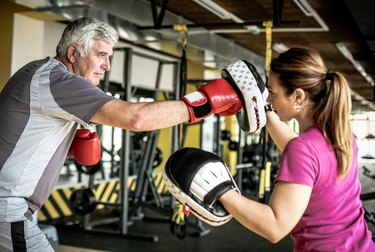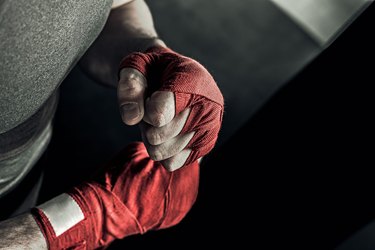
The idea of boxing can be very intimidating, no matter your age. It's a fascinating sport with its mixture of strikes and strategy, but working up the courage to step into a boxing gym can take some time. If you've waited until you're over 50, don't let your age deter you—there are professional boxers who still fight in their 50s!
Older Boxers
Video of the Day
Bernard Hopkins, who won world championships in multiple weight classes throughout his career, fought his last professional bout at age 51. While you might not have any interest in a professional or even amateur boxing match, Hopkins proves that you can still throw punches and move nimbly at the age of 50.
Video of the Day
If you have an interest in competing, you can do a masters boxing competition. Australia Boxing, for example, has a masters class for people over age 40. Their rule, according to their site, is that you can't fight anyone more than 10 years older or younger than you.
Read More: Cardio Exercises for Seniors
Benefits of Boxing
As you age, it's important to stay physically active. Boxing is an exciting sport that helps you maintain and even improve your physical ability. When you train for boxing, you strengthen the muscles of your upper body, such as you chest, shoulders and triceps that help you punch. Your legs get stronger because they develop the power for your punches.
Boxing is a fast-moving sport, and you need to react quickly to dodge and throw punches. Training as a boxer will improve your reflexes and hand-eye coordination. You'll also improve your ability to balance because boxers need to maintain their center of gravity to throw effective punches.
Even those with from age-related diseases, like Parkinson's, can get in on the action. Delgado's Boxing, a gym in Atlanta that trains people with the disease. Some of the trainees even claim that their symptoms have reversed since beginning boxing training.
Heart disease, one of the most dangerous health conditions in the modern world, can be slowed by exercising regularly. Aerobic exericse, like boxing, improves and maintains heart health and function and decreases your risk of heart attack.
Read More: What Are the Health Benefits of Boxing?
Training Adjustments Over 50
If you're well past the age of retirement you can still box, if you make some adjustments. Seated boxing training takes away the risk of falling but you still get to throw punches, working your core and upper-body muscles. If you have a lower-body injury or a neuromuscular disease like Parkinson's, seated boxing is the safest option. Avoiding injury is important if you're over 50, because your body takes longer to recover as you age.

Safety Precautions
Before you start throwing punches, take proper precautions to avoid injury. Start by using hand wraps to protect the bones of your fist and wrist. When you put cotton hand wraps on, be sure to wrap them around your wrist and knuckles three or four times each to secure your bones.
Boxing gloves come in different sizes, depending on how much protection you want. 16-ounce gloves are generally the biggest you can buy, and offer the most padding. Use these for boxing practice to protect your knuckles from injury.
If you decide to spar, be sure to wear headgear and a mouthpiece. Head protection is important to prevent concussions and cuts. Wearing a mouthguard protects your teeth but it can also dampen the damage to your brain from punches.
Even with safety gear on, the competitive aspect of boxing can be dangerous. Stepping into a ring with an opponent means you're likely to be hit in the head or torso. It's safer to stick with basic training. Hit the heavy bag, speedbag or double end bag to improve your aerobic fitness. Jump rope to improve your endurance and coordination. Have a coach hold punching mitts so that you can simulate a fight. There are many ways to train when you're above 50 that don't include combat scenarios.
- BBC: Steve Ward, 59, Retains World's Oldest Boxer Title
- The Glowing Edge: 10 Frequently Asked Questions About Boxing After 40
- Over 50 Fitness and Health: Is 50 Too Old to Start Boxing?
- USA Today: Bernard Hopkins at 50: Older, wiser, still fighting
- CBS Los Angeles: Simi Valley Seniors Use Boxing To Stay Fit, Focused And Happy
- Medscape: The Role of Mouthguards in Sports-Related Head Injuries